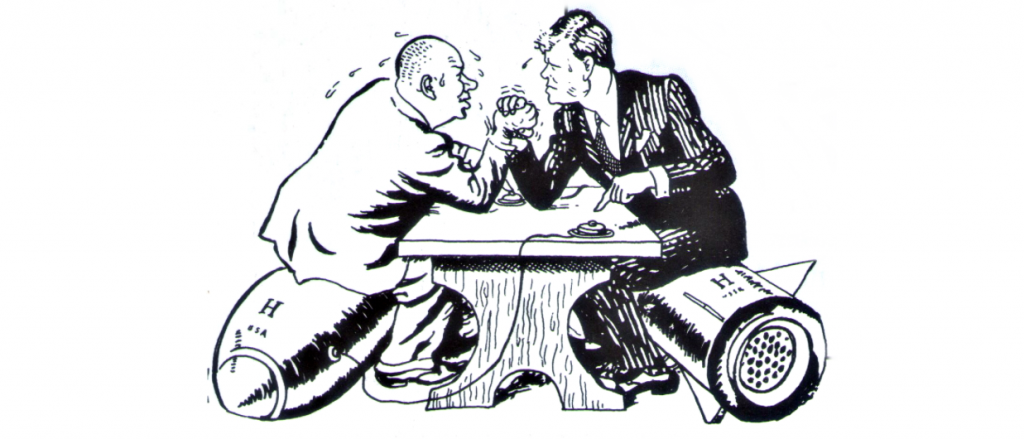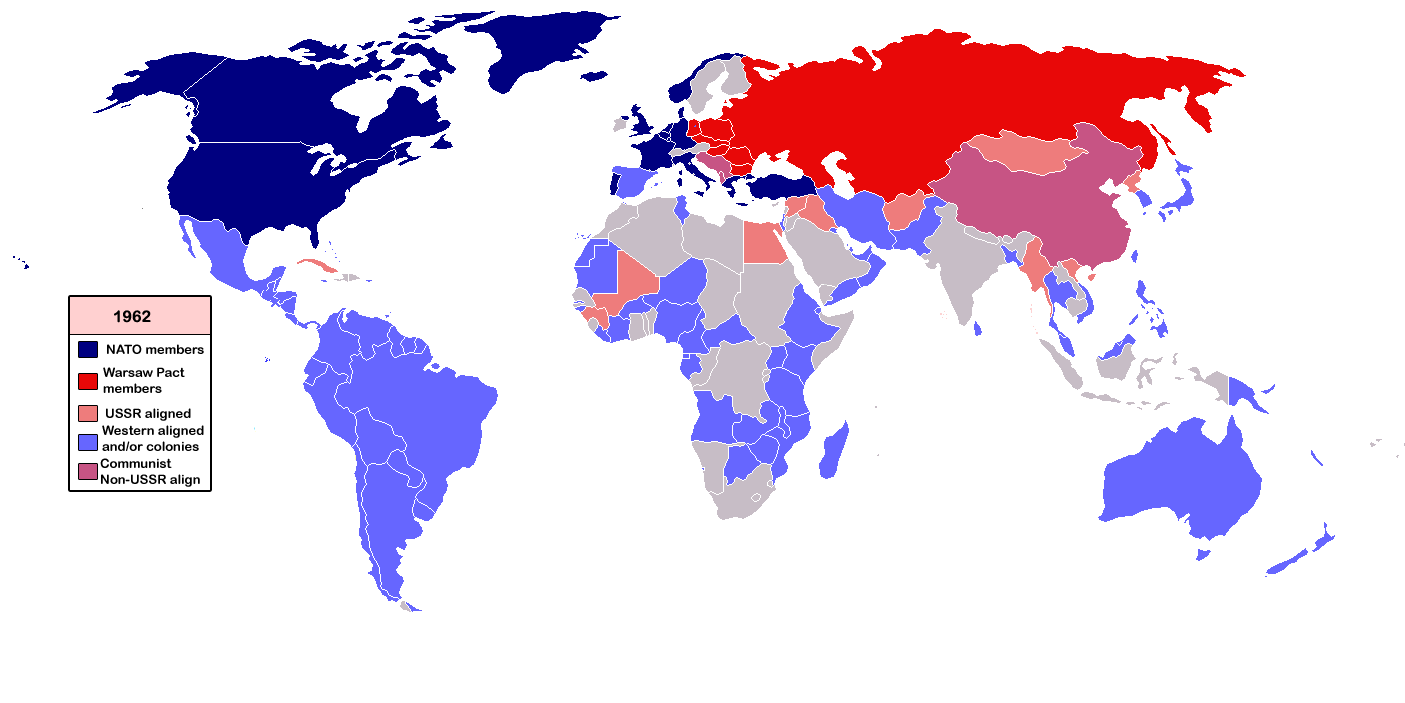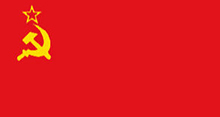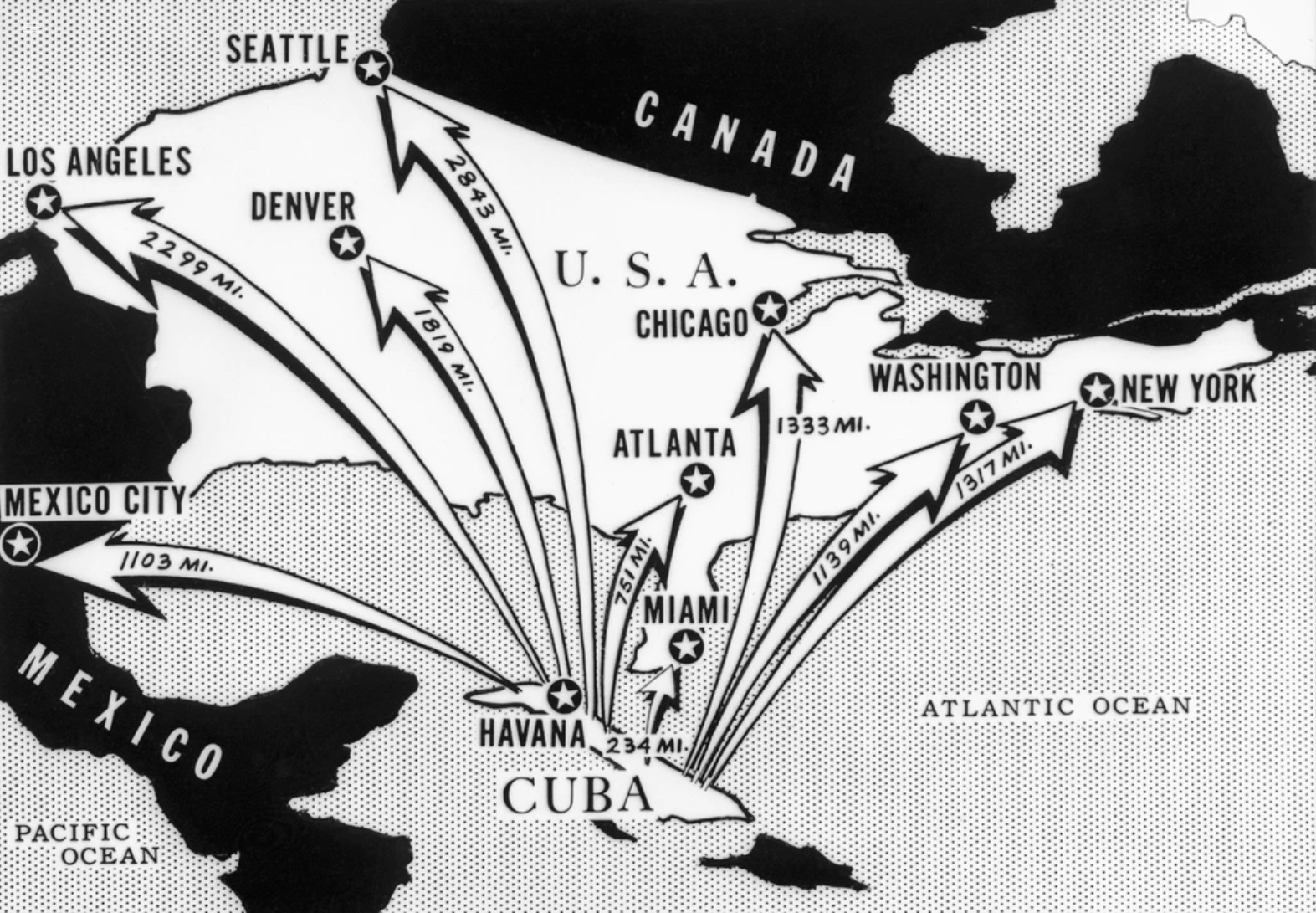The Cuban Missile Crisis

We’re eyeball to eyeball, and I think the other fellow just blinked.
Dean ruskIn 1962 the world was getting ready for what seemed an inevitable war. The war which would be fought over ideologies not territory. The world at this time had two dominant superpowers always trying to out do the other, always looking for a way to destroy the other. These world powers were called the United States of America and the Soviet Union and both had very different styles of government.
On the one hand the USA believed in individual wealth called capitalism which has been the basis of society for centuries, as well as democracy which believed in the people having a say in how the country is run, for example, who runs it. On the other hand, the Soviet Union believed in communism which is the idea of collective wealth where everyone has the same and everyone works towards one common goal.However, it was a one party system which means the leader can stay in power for life.
Both systems have their flaws and neither side were able to actually achieve what their ideology actually meant. Still to this day no country has ever fully completed the goals of democracy or communism. This is because democracy requires that everyone in a country can take part in every decision made by a government. Also with communism it relied on the idea that everyone was born a good person and is willing to share. However, inevitably there is always going to be someone who wants more than everyone else meaning the Soviet Union ended up being a socialist state which is half way to communism.
Both super powers also had some powerful allies, split along the very same ideas as them. The USA’s alliance was called NATO (North Atlantic Treaty Organization) which consisted of mostly western European democracies and commonwealth countries (countries which used to be under British control). On the other side is the Warsaw Pact which consisted of countries where the Soviet Union had established puppet governments at the end of WW2, which was nearly all of eastern Europe. This gave the two factions a direct border which was manned by hundreds of thousands of troops rising tensions on both sides.
Despite all of this the most concerning news was that both sides had discovered nuclear bombs. These weapons had the ability to flatten a city and make it uninhabitable for centuries. Each side funded these weapons to an unprecedented amount which lead to both sides stockpiling them amounting to over a thousand on both sides. If a war ever broke out and these weapons were used it could send humanity back to the stone age.


US nuclear warhead arsenal

USSR nuclear warhead arsenal
In 1962 tensions were rising on both sides with each side aggravating the other. The US had stationed nuclear warheads in Turkey which would be able to hit all major Soviet cities. In reaction to this the Soviets then stationed their own nuclear warheads in Cuba. Cuba had recently undergone a communist revolution and its leader Fidel Castro was afraid of the US launching an invasion. So in reaction to this gave permission to the Soviets to place nuclear warheads in Cuba as a deterrent.
Shortly afterwards US spy planes spotted these weapons which caused extreme anger within the US. The President at the time John F. Kennedy reacted almost immediately by placing a “quarantine zone” around Cuba which was effectively a blockade. This was to stop any soviet ships from reaching Cuba with the threat of force. Although both sides were staunch enemies they were both aware of each others destructive capability. This led to both sides threatening war but neither side following through because they knew it could lead to an end of humanity.
This period lasted 13 days in October 1962. Tensions rose to their highest point when the US went to defcon 2 one stage away from nuclear war. As well as this an American spy plane was shot down over Cuba nearly causing a full invasion of Cuba. However nuclear war seemed closest when a Soviet submarine was signaled to come to the surface by a US destroyer via depth charge. The crew had thought the war had begun and almost fired a nuclear torpedo. Thankfully the decision had to be unanimous from the three most senior figures and both the captain and political officer voted to launch. However, the second in command Vasil Arkhipov voted against it.
Despite all of this diplomatic talks still held as both sides looked for a way out of this crisis. In secret the American attorney general Robert Kennedy and Soviet ambassador Anatoly Dobrynin worked to negotiate a solution. After intense negotiations both sides came to an agreement, the main reason for negotiations taking so long is that neither side wanted to look weak in the face of the other
The conditions for the US were to remove their nuclear missiles from Italy and Turkey which had been a big factor for why the Soviets puts theirs in Cuba as they claimed it was for defensive purposes. Another condition was that the US could never invade Cuba mostly for the benefit of keeping an allied foothold in the new world. This was in exchange for all the missiles in Cuba to be removed under UN (united nations) supervision. Shortly after the Soviet ambassador called Moscow and said that “Time is of the essence and we shouldn’t miss the chance. Following this Khrushchev agreed to the deal and missiles started to be taken down.
Although this deal saved the world from thermonuclear war both sides received much criticism from the public. This was largely down to the fact that especially from American perspective they had given in to the “devil” as it was referred to at the time. This led many to fear that such a crisis could happen again since the Soviets had seemed to come off better. Despite all of the criticism modern historians revere the work done during the negations.
We will not prematurely or unnecessarily risk the costs of worldwide nuclear war in which even the fruits of victory would be ashes in our mouth, neither will we shrink from that risk at any time it must be faced.
John F. Kennedy

A fantastic post, a really great read. Visually impressive too, look forward to seeing more. Well done!!
Good work, Lewis. Brings it all back to me. I was 16 at the time and I remember how scary it was!